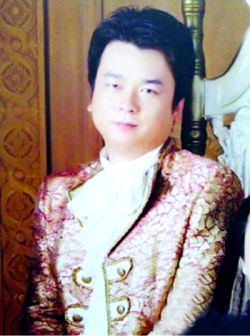Zhou Jiangjiang
Zhou Jiangjiang (周江疆), general manager of the Yantai branch of the Tongzhou Construction Company in Shandong Province, died in a factory fire while trying to save his 10 employees on July 2, 2012.
Born in 1984 in Nantong, Jiangsu Province, Zhou was the only son of the couple Yang Guoxing and Zhou Yuxiang and took his mother’s surname. Graduating from the Suzhou University in 2006, majoring in financial management, Zhou Jiangjang came to Yantai to help his father’s business. He was a successful businessman and future inheritor to the family firm’s substantial wealth.
At around 1:00 a.m. on July 2, 2012, a fire broke out in a room on the third floor of the real estate company. 28-year-old Zhou Jiangjiang lived nearest to the stairs. He ran out of the smog-shrouded building first, but bravely went back to wake up his employees then sleeping on the floor.
The fire, caused by an air-conditioner short circuiting, quickly engulfed the whole third floor where the 10 employees slept. Zhou managed to go back the first time to wake up eight of them despite the choking smog. When he knew there were still two left on the floor, he rushed back again, ignoring his girlfriend's dissuasion.
All the employees went through the accident unscathed, but Zhou collapsed on the stairs and never fled the fatal disaster. He died after inhaling too much smoke, since there were few burns found on his body, according to local fire fighters.
Zhou's father Yang Guoxing, chairman of the board of directors of the company and a real estate tycoon in Nantong, said his son fulfilled his responsibility as the head of the company. The father still had trouble accepting the misfortune, as his son, also a member with the reserve troops, was just promoted to be awarded as lieutenant on June 30 and the conferring ceremony was scheduled to be held on July 5. Zhou's comrades-in-arms sent the new uniforms and certificate of the appointment to Zhou's father after hearing about the accident.
According to employees of the company, Zhou was an amicable boss who lived and ate together with his staff, and always paid much attention to their difficulties and helped them.
Zhou's heroic deed triggered widespread discussion on Internet micro-blogs. Some postings said Zhou was a typical man among "the rich second generation" – those Chinese born in rich families after the 1980s, who tend to be eligible to inherit money and assets from their parents. The "rich second generation" is always criticized as being idle, arrogant and even depraved. Zhou's case showed that they can be just as responsible.
Some postings said Zhou set a good example for "the tall-smart-rich" (高帅富) group, another Internet popular word to describe men with fame and fortune. "Benevolence itself has nothing to do with the rich and the poor. Only because people have read too many heartless stories of arrogant management staff, they pay particularly close attention to the identity of the rescuers," a netizen said.
